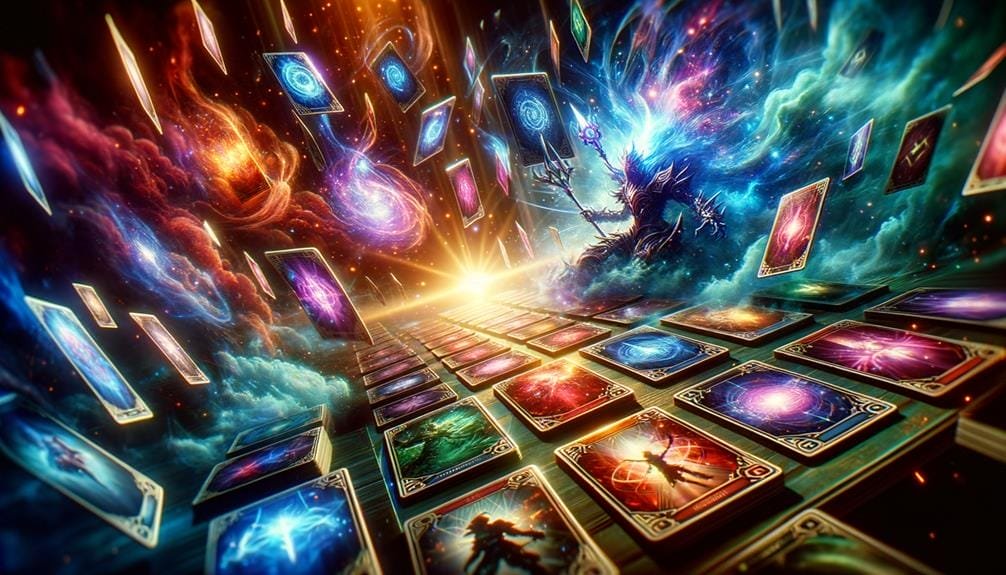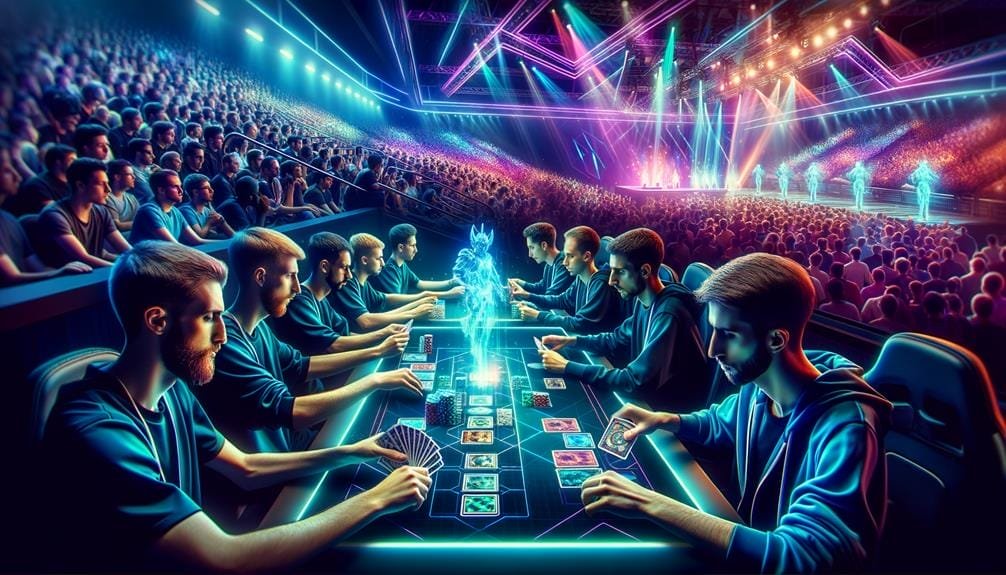Our Newsletter
Sign up for our e-mail newsletter and stay informed for what’s next on the horizon.
Esports card games are akin to supercharged chess. These are not your regular 52 card decks but unique collections that animate fantasy worlds right before your eyes.
As we journey through these digital terrains, we’re strategizing, making thoughtful choices, and participating in intense battles of skill and intellect, reminiscent of the challenges found in trading card games.
We have much to discuss about the nuances of these games, the tactics that define winners, and the thrilling professional scene. Eager to plunge into the action and investigate with us?
As we pause on this gaming journey, we’re thrilled about the opportunities that lie ahead with updates and new releases.
Imagine a future where eSports card games aren’t just our ‘hidden advantage,’ but a global sensation.
As we navigate this digital world, we’re not just players in card games; we’re pioneers in shaping the future of free-to-play card games.
So, here’s to the thrill of the game, the camaraderie of our community, and the undiscovered lands yet to be found.
Let the games commence, friends. The future of eSports card games, including real-time TCGs, is ours to shape.
We’re about to journey into the universe of eSports card games, a domain where strategy, luck, and skill fuse to form an exhilarating contest.
We’ll initiate by mapping the growth of these games, then progress to clarifying their basic and advanced elements.
Ultimately, we’ll scrutinize their transformative impact on the gaming community.
Over the last few years, eSports card games have seen a significant increase in popularity due to their distinct game mechanics, fierce competitive aspect, and the thrilling mix of skill and chance they present. These games have won over players and viewers alike, providing a strategic and skill-focused experience that’s challenging to equal.
Gamers carefully construct decks, make critical tactical choices, and outwit opponents in gripping contests. Proficiency is critical, but there’s also a factor of chance, introducing an additional level of thrill. The appeal of collecting cards, forming synergistic decks, and the unpredictability each match offers have contributed to the popularity of these games.
This swift expansion has resulted in substantial prize funds, a vibrant competitive community, and a varied global player population.
The rise and popularity of eSports card games is something to behold, and understanding them, from the ground up to the complex tactics, is vital. These aren’t just games of chance; they’re strategic skirmishes demanding thorough deck construction, tactical judgement, and a clear grasp of the guidelines, crucial for any player looking to excel.
Each distinct card set provides a wealth of strategic options, ensuring each game is a new challenge. Ability undoubtedly has a key role, but the excitement of fortune – the unforeseeable factor that can change the game at any point – shouldn’t be overlooked. The attraction is in amassing cards, building harmonious decks, and outsmarting your adversary in a mental duel.
This vibrant mixture of strategy and unpredictability attracts a wide range of players, including those fascinated by the Marvel Universe.
Redefining the gaming universe, eSports card games have ingeniously merged intricate card gameplay with the adrenaline rush of online tournaments, changing not only our playing methods, but also the ethos of the gaming community. These games have etched a unique segment for themselves, drawing a varied audience enticed by the exhilarating opportunity of acquiring distinct cards and crafting harmonized decks.
Here’s a summary of their influence:
| Impact on Gaming Culture | Explanation | Example: Using a spell card effectively in a trading card game can turn the tide of a match, showcasing the strategic depth these games offer. |
|---|---|---|
| Transformed Gameplay | Intricate card gameplay combined with online tournaments | Hearthstone’s challenging scene |
| Varied Player Audience in trading card games signifies the inclusivity and broad appeal these games hold, attracting participants of all ages and skill levels. | The allure of acquiring distinct cards and crafting decks is akin to unlocking new monster cards in a game, constantly drawing in players looking for that next level of strategy. | Magic: The Gathering Arena’s international audience |
| Tournament Rewards | Considerable prize funds attracting premier players | Gwent’s World Masters with $250,000 prize fund |
As such, the influence of eSports card games symbolizes the evolution of traditional card games into a digital, combative format.

We’ll now examine in detail a handful of the prominent eSports card games that have left a notable mark on the sector.
We’ll be focusing on Hearthstone: Heroes of Warcraft, Magic: The Gathering Arena, Gwent: The Witcher Card Game, Legends of Runeterra, and Yu-Gi-Oh! Duel Links, a game where players can unlock powerful monster cards.
Each of these games brings to the table distinct gameplay strategies, opportunities for competition, and loyal fan bases, adding to the rich variety of the card game eSports scene in the world of gaming.
When we shift our attention to Hearthstone: Heroes of Warcraft, we’re taken in by its captivating gameplay and broad popularity, establishing it as one of the best digital trading card games available on PC. It distinguishes itself in the realm of eSports card games, boasting some of the most distinguished tournaments and champions.
Let’s delve into the subtleties of its gameplay, the thrilling tournaments, and the champions who’ve left an indelible mark on the history of this game.
Immersing in the realm of Hearthstone, a digital collectible card game crafted by Blizzard Entertainment, we’re entranced by its tactical gameplay, appealing visuals, and the vibrant mix of skill and chance it presents.
The game’s user-friendliness, regular updates, and fluid gameplay keep players engaged.
From constructing decks to making strategic choices, Hearthstone’s complex design and broad allure make it a distinctive presence in the esports card game domain.
Diving into the arena of Hearthstone tournaments, we find a battleground where players like Pavel ‘Pavel’ Beltukov, Chen ‘Tom60229’ Wei Lin, and James ‘Firebat’ Kostesich have left their mark.
These high-stakes tournaments, with a robust $500,000 prize pool, deliver a gripping display of tactical gameplay, highlighting the abilities of elite players.
Here, aptitude and tactics carve out winners, turning Hearthstone into an engaging feature of esports card games.
We’ll now focus on Magic: The Gathering Arena, a digital reinvention of a classic card game that has made a significant mark in the eSports industry.
Its central tournaments and Magic Pro League haven’t only excited players and spectators, but also contributed immensely to the expansion of eSports card games.
We’re on the verge of discussing how MTG Arena has effectively combined traditional card gaming with digital innovation, and how its competitive landscape is influencing the future direction of eSports.
In the domain of eSports card games, Magic: The Gathering Arena serves as a symbol of the digital resurgence of the classic card game genre, fusing conventional gameplay with innovative digital aspects.
Its triumph not only rejuvenates the card game esports scene but also ignites discussions on its unadulterated esports status and its impact on popular card games like Magic: The Gathering and Yu-Gi-Oh!.
The game’s progression indicates the promising future of competitive gaming.
As we adjust our perspective to the competitive side of Magic: The Gathering Arena, spotlighting the Magic Pro League becomes essential. This esteemed tournament lures the best players from all corners of the world.
The league stands as an acknowledgment in the competitive card game domain. It displays top-tier gameplay and strategic profundity. The events draw a worldwide audience, boosting the stature of eSports card games.
We now focus on ‘Gwent: The Witcher Card Game’, a significant force in the card game eSports sector, popular for its RPG elements. Recognized for its distinctive game rules and a loyal community, Gwent distinguishes itself with its tactical complexity and captivating game process.
Moreover, the official eSports series, ‘Gwent Masters, a prestigious tournament for one of the most popular trading card games, emphasizes the skill and strategy behind card battles.’, presents high-level competitive gameplay, drawing in players from all over the globe.
Venturing into the universe of Gwent: The Witcher Card Game, we find a one-of-a-kind eSport card game that has attracted a loyal following with its unique game mechanics and profound strategic aspects.
Leveraging the novel mechanics and robust fanbase of Gwent: The Witcher Card Game, we find ourselves in the thick of Gwent Masters, the official eSports series that propels this distinctive card game to an entirely new level of tactical competition. With significant risks, elite participants, and a systematic setting, it’s a genuine demonstration of the expansion and allure of eSports within the card game genre.
| Gwent Masters | Top Participants | eSports Expansion in the world of gaming continues to evolve with each update and new release. |
|---|---|---|
| Official Series | International Competitors | Card Game Genre |
| Significant Risks in developing roguelike card games | Tactical Gameplay | Structured Championships |
| Systematic Setting in updates and new releases. | Esteemed Titles | Professional Stage |
Continuing our review of prominent eSports card games, we now turn our attention to Riot Games’ Legends of Runeterra (LoR). This game is transforming the digital card game scene with its dynamic Champions and distinct gameplay mechanics.
We’ll also touch on its competitive aspect, with a particular emphasis on seasonal tournaments and their role in enhancing the game’s player versus player encounters, showcasing the dynamism trading card games offer.
Within the sphere of eSports card games, one can’t overlook the way Legends of Runeterra (LoR), birthed by Riot Games, is reshaping the field with its dynamic Champions, engaging contests, and striking card illustrations.
The influence of LoR on digital card games is unequivocal.
In the exhilarating universe of Legends of Runeterra, an arena exists where elite players compete in seasonal tournaments, contending for significant cash rewards and international acknowledgement.
It goes beyond mere fortune, requiring strategic deck creation and proficient gameplay in popular card games such as Hearthstone and Marvel Snap.
This competitive environment provides a stage for players to display their expertise, drawing in a worldwide viewership and reshaping the eSports card games scene.
Shifting our attention to Yu-Gi-Oh! Duel Links, we find a game that has adeptly brought the traditional duels of its physical version into the digital era.
With its global tournaments and community gatherings, it has crafted a captivating eSports platform.
Let’s look closer at how this game has influenced the terrain of eSports card games.
As we examine the terrain of eSports card games, it’s hard to overlook the considerable influence of Yu-Gi-Oh! Duel Links, a game that adeptly transitions traditional dueling into the digital era.
In the realm of eSports card games, the Yu-Gi-Oh! World Championships serve as a beacon of talent, strategy, and deck-building prowess of players worldwide. These contests and social gatherings nurture a rich sense of unity among aficionados of trading card games.
Yu-Gi-Oh! Duel Links, a favored online variant, further enhances this community atmosphere, providing a captivating platform for competitive gaming and deck-building excellence.

Let’s delve into the professional landscape in eSports card games.
We’ll investigate the requirements to become a professional player, concentrating on the necessary skills and the routes to achievement.
We’ll also touch upon the function of teams and organizations in nurturing talent and shaping the competitive environment.
In the arena of eSports card games, the path to becoming a pro gamer is an exhilarating one, packed with rigorous practice and high-stakes competition, reflecting the thrill of a gamble in games like Spire and Marvel Snap.
Elite gamers adhere to demanding training routines that sharpen their tactical abilities and game sense.
Let’s delve into this journey and the training techniques that enable gamers to rise to the zenith of the professional circuit.
Pursuing a professional career in eSports card games demands a powerful combination of commitment, competence, and a thorough knowledge of the game’s intricacies.
The journey to becoming a pro can be tough but fulfilling.
Examining the strict training routines of elite players in esports card games, we observe a mix of thorough daily practice, strategic thinking, and mental resilience that lays the groundwork for excellent performance. These experts emphasize regularity, commitment, flexibility, and ongoing education. To exemplify, let’s refer to this table:
| Routine | Importance |
|---|---|
| Daily Practice | Sharpens skills |
| Strategic Analysis | Boosts decision-making |
| Healthy Lifestyle | Bolsters focus, stamina |
| Mental Training | Handles stress, maintains top performance |
Focusing on teams and organizations in the eSports card games sector, it’s crucial to acknowledge the influence they exert in molding the professional sphere.
These prominent groups not only act as a stage for talented individuals but also cultivate collaborations and sponsorships that drive the scene towards progress.
We’ll examine the operations of these entities and the consequences they bear on the professional eSports card game environment.
In the eSports card game sphere, notable teams like Cloud9, Team Liquid, and TSM consistently make an impact with their formidable line-ups, strategic mastery, and remarkable achievements.
Within the challenging world of eSports card games, sponsorships and partnerships aren’t just advantageous, they’re indispensable, delivering the financial backing and resources that teams and institutions require to flourish. They amplify player experiences, augment visibility, and boost fan involvement.
Now, we shift our focus to the intricate art of formulating decks and the strategic subtleties involved in eSports card games.
We’ll study how gamers assemble their decks to outwit adversaries in real-time card games and how high-level tactics influence the result of these virtual fights.
From comprehending the basics to scrutinizing complex maneuvers, gaining insight into these facets is essential for thriving in this fiercely contested environment.
Becoming proficient in deck construction in eSports card games is an adventure that’s as thrilling as it’s demanding.
We need to stay aware of the current meta trends, comprehend various deck categories, and plan strategically in our course of action.
It’s about trial and error, gaining knowledge, and adjusting, always aiming to craft a deck that not only aligns with our game style but can also hold its own against the competition.
Venturing into the domain of esports card games, it’s essential we monitor meta trends meticulously, as they carry substantial weight in shaping our strategies for deck construction and plotting our subsequent moves.
Expanding on our knowledge of prevalent trends, we now pivot our attention to the diverse deck types in esports card games and their distinct strategies. These include aggro, control, midrange, combo, and tempo, key strategies in games developed by Blizzard Entertainment.
Ranging from swift aggression with aggro decks to carefully planned late-game wins with control decks, each style possesses its own method. This demands varied tactics, card pairings, and a grasp of game rhythm.
Venturing further into the arena of eSports card games, mastering advanced play tactics is crucial for improving our gameplay.
We should concentrate on the subtleties of game phases and decision making, along with mastering the skill of counterplay and adjusting strategies.
These aspects not only deepen our knowledge of the game but also equip us with the abilities necessary to outsmart our rivals and come out on top in challenging situations.
In the sphere of eSports card games, progressing through game stages and making tactical choices are key to outmaneuvering opponents and gaining victories.
Once we’ve gotten a handle on the fundamental stages and choices in eSports card games, we shift our focus to the more intricate strategies of counterplay and adaptation techniques. This involves foreseeing the actions of your opponents and modifying our approach to play. To excel in this, one needs to comprehend prevalent strategies and modify our deck to keep up with current trends.
| Counterplay Techniques | Adaptation Methods in roguelike card games |
|---|---|
| Predicting Opponent’s Actions | Modifying Deck to Metagame |
| Grasping Common Strategies | Unforeseen Moves |
| Proficiency in Advanced Strategies | Effective Resource Management |

Transitioning now to an exhilarating element of eSports card games – the competitions and titles.
These occurrences not only exhibit the complex strategy involved in these games but also demonstrate the high-risk contests that draw top gamers from around the world to eSports TCG competitions.
We’ll touch upon significant events, their influence, and the enthusiasm they inject into the eSports domain, particularly focusing on how card games offer both excitement and educational value.
As we shift our focus to the dynamic world of eSports card game tournaments, it’s remarkable to see how these contests have matured.
Significant tournaments have unique structures that challenge the strategic acumen of the players, turning each game into an exciting spectacle.
Beyond the recognition, these tournaments deliver substantial prize funds, providing a feasible route for proficient gamers to make a living.
Venturing into the realm of eSports card game tournaments, it’s impossible to overlook the distinct formats and regulations that structure these competitive events, especially the widespread use of Swiss rounds followed by elimination brackets.
Comprehending the layout and sequence of these tournaments is vital, as is understanding the monetary benefits and income prospects that accompany these intense card game contests. Top competitors have the potential to make a living from prizes, endorsements, and the creation of content. Let’s examine the possible income:
| Tournament | Prize Pool |
|---|---|
| Leading esports card game tournaments in 2020 | $400,000 – $1,000,000+, highlighting the significant earnings potential in the evolving world of gaming. |
| Hearthstone World Championship | Substantial cash rewards |
In our journey through the world of eSports card games, we can’t overlook the significant events that characterize this dynamic arena.
From the schedule of principal competitions to the assortment of live streaming platforms that animate these conflicts, these components contribute greatly to the gaming journey.
We welcome you to accompany us as we investigate these remarkable tournaments and championships, along with the platforms that transmit every card draw, strategic move, and triumph.
In the sphere of eSports card games, a series of pivotal tournaments punctuates the calendar, serving as exciting arenas for the tactical intellect of players worldwide.
These events underline the tactical complexity and international allure of eSports card games.
For those wanting to experience the intense thrill of eSports card game tournaments, commonly used streaming platforms include Twitch, YouTube Gaming, and official game channels. These platforms provide live coverage, game breakdowns, and interviews with players.
| Streaming Platform | Notable Tournament in the roguelike card game arena |
|---|---|
| Twitch | Hearthstone World Championship |
| YouTube Gaming | Magic: The Gathering Pro Tour, a pinnacle event in the TCG community |
| Official Game Channels | Legends of Runeterra Tournaments |
This allows enthusiasts a thorough viewing experience, from high-stakes matches to exclusive behind-the-scenes content in the arena of the best pc card games.
Our focus now shifts to the dynamic community and culture that enfold eSports card games.
It’s intriguing to witness how these games have nurtured a loyal community that goes beyond the digital world, with players actively participating in discussions, exchanging strategies, and even arranging local gatherings.
Let’s delve into how these eSports card games are molding gaming culture, and the significant part the community plays in this continuously changing scenario.
Establishing a strong community around eSports card games extends beyond just the games themselves. It involves developing engaging platforms such as fan sites, discussion boards, and social networks where enthusiasts can link, exchange tactics, and intensify their enthusiasm for the game.
Content production and broadcasting are also vital in promoting community expansion and keeping the fanbase involved and thrilled.
As the interest in eSports card games keeps growing, the real heart of the community lies within the fan sites, forums, and social media platforms that bring together players and enthusiasts from all corners of the globe.
Fan sites and forums are abundant with strategic talks and tournament chatter.
Social media avenues bridge fans from all over the world.
These mediums facilitate the exchange of game knowledge, improving player experience and contributing to the expansion of the eSports card game community, which continues to evolve.
In the evolving world of eSports card games, content creators and streamers are the indispensable elements that nurture an energetic, knowledgeable, and interconnected community.
They enthrall audiences with delightful gameplay, thought-provoking strategies, and live tournament broadcasts.
Through platforms like Twitch and YouTube, they’ve morphed eSports card games into a communal experience, encouraging expansion and continuity by drawing new participants to the competitive arena.
In the sphere of eSports, card games have transitioned from a specialized hobby to a popular occurrence that profoundly affects gaming culture. Their societal repercussions are immense, strengthening ties within the gaming community and fostering a culture of strategic competition and fellowship.
As we scrutinize the role of these games, we’ll see how their influence spreads beyond the digital realm, shaping community, culture, and the very essence of gaming society.
The transformation of card gaming from a specialized interest to a popular trend has significantly altered the gaming community’s terrain, birthing a lively subculture focused on strategic gameplay and inventive deck-building.
Crossing global lines and uniting different cultures, eSports card gaming has risen as a powerful social factor in the universal gaming network, cultivating a diverse and lively community. It encourages cooperation, fair play, and tactical reasoning, aspects that are fundamental to the success of trading card games.
Digital discussion platforms, social networking groups, and live broadcasting channels bring together gamers from all corners of the globe, surpassing physical restrictions. Indeed, eSports card gaming is a lively component of the gaming tradition, forming bonds, promoting courteous rivalry, and commemorating collective enthusiasm. Card games offer a unique platform for engagement and challenge, especially with the rise of free-to-play card game models.

As we gaze into what lies ahead, the future of eSports card games, including Pokémon TCG and Magic: The Gathering, is filled with intriguing opportunities.
We’re witnessing a transformation in game design, with creative alterations that are redesigning the terrain of this genre.
Concurrently, the world of eSports card games keeps growing, introducing fresh dynamics and chances for both participants and observers.
Peering into the future of eSports card games, it’s evident that technological progress is altering the terrain. Developments such as AI and VR aren’t merely improving gameplay but are also forging a deeper and more engaging experience for gamers.
In addition, the advent of blockchain technology promises to introduce unmatched security and openness to the sector, possibly redefining the way we engage and compete.
Exploring the sphere of technological advancements, it’s evident that breakthroughs such as virtual reality and blockchain are significantly altering the landscape of eSports card games. These innovations set the stage for captivating gameplay and secure transactions.
Building on the idea of technological progression in eSports card games, we now witness the rise of artificial intelligence fundamentally altering the gaming environment, making trading card games more complex and engaging. AI adversaries, improved by machine learning, adjust to player tactics, resulting in more dynamic gameplay.
This progression seeks to develop convincing, human-like adversaries, thereby creating opportunities for personalized gaming encounters suited to the distinct style of each player.
Peering into the future of eSports card games, we can’t overlook the thrilling titles on the brink and the progression of competitive play.
These novel games and tournament styles aim to raise the strategic complexity and viewer pleasure of this emerging sector.
Within the fast-paced world of eSports card games, titles such as Vanguard ZERO, a popular free-to-play card game developed for mobile platforms, Shadowverse CCG, and Yu-Gi-Oh! Master Duel are emerging as ones to keep an eye on.
Gazing into the future of esports card games, we anticipate a panorama filled with creativity and broader competitive prospects.
Thanks to the continuous expansion of online gaming, we predict a wider range of players and fans.
Technological breakthroughs such as virtual reality and blockchain will mold the future of tournaments, making them more captivating, especially in the realm of trading card games.
The future holds promise, with an emphasis on improving player experiences and establishing new competitive platforms.
As we progress in our understanding of eSports card games, it’s vital to acknowledge the difficulties and disputes that are present. Achieving equality in gameplay while upholding a professional yet approachable atmosphere can be a multifaceted challenge in popular card games available on PC.
We’ll consider how regulations for fair play and professionalism coexist with accessibility in this dynamic and contest-driven setting.
As we explore the world of eSports card games, we come across two significant challenges: cheating and the controversial pay-to-win models.
The trustworthiness of these games is frequently tested by players who take advantage of glitches or resort to cheats, going against the ethos of fair competition.
In addition, the ongoing discussion about whether purchasing in-game benefits with real money disrupts the evenly matched playing field continues to ignite debates.
Venturing into the intricate domain of esports card games, it becomes evident that tackling cheating and exploits is a vital part of promoting fair play and regulation.
This ensures an even playing field, vital for the reputation and expansion of esports.
In the competitive arena of eSports card games, pay-to-win structures have ignited a fiery discussion concerning their implications on fairness, player competence, and sportsmanship, especially with titles developed by Blizzard Entertainment. Detractors contend they foster inequality, minimizing the importance of skill. To assuage these worries, rules are being put into motion to guarantee an equitable environment.
Yet harmonizing income production with sportsmanlike conduct continues to be a task of complexity, especially in the free-to-play card game industry.
While maneuvering through the field of eSports card games, we tackle the intricate task of marrying professionalism with user-friendliness.
The responsibility of game creators and the societies they nurture is paramount in guaranteeing a wholesome competitive atmosphere.
Let’s look into how to surmount these hurdles, address disputes, and aim for a more inclusive and professional eSports card gaming scene.
Game developers and communities play crucial roles in handling challenges and controversies in esports card games. Developers focus on balancing competitiveness with user-friendliness, while communities provide valuable feedback for game improvement. Striking a balance between maintaining a professional environment and ensuring the game’s appeal to a diverse player base poses a significant challenge.
Developers establish a harmony between the competitive aspects and the ease of use, making games like Griftlands available on PC.
Communities offer essential feedback for the betterment of the game.
Establishing a professional atmosphere while keeping the game appealing for a wide range of players continues to evolve as a significant challenge.
To ensure a robust competitive environment in esports card games, we need to carefully manage the equilibrium between upholding rigorous competitive standards and encouraging participation from players across all skill levels. Tackling problems such as cheating and game balance safeguards tournament integrity, ensuring the community receives the latest updates and new content.
Transparent rules and guidelines, resources for honing skills, and cooperation with all involved parties are crucial to nurturing a just, captivating, and enduring competitive environment.

As our conversation on eSports card games comes to an end, let’s gaze into the potential future.
The expansion of this category is indisputable, with fresh games and contests appearing consistently.
Whether you’re an experienced player or a beginner, there’s never been a more thrilling time to participate.
The horizon of eSports card games is undeniably rich, characterized by a swift transition from conventional physical versions to lively electronic ones. This shift is altering the terrain of professional gaming. Here are three crucial observations that emphasize this shift:
In short, the horizon of eSports card games is colorful, filled with creativity and possibilities.
The eSports card game genre is witnessing impressive expansion, driven by the popularity of digital card games like Hearthstone and MTG Arena. There’s a surge in tournaments with significant prize pools, drawing in top competitors and spectators. The fusion of tangible and digital components is defining the future of competitive gaming.
| Digital Card Game | Prize Pool |
|---|---|
| Hearthstone | $1,000,000 |
| MTG Arena | $750,000 |
This ongoing progress and innovation are indicators of a bright future. From our standpoint, the transition from physical to digital forms underscores the continuous expansion in eSports card games. It’s a thrilling period, and we’re confident that the best is yet to come.
Without a doubt, we’re on the brink of a revolutionary phase in the realm of eSports card games. The future shines brightly, offering a wide array of competitive scenarios and immersive gameplay experiences in the best pc card games and card RPGs.
As newcomers, we encourage you to keep these three things in mind: the rank system, the diversity of spells available, and the importance of tactical planning in trading card games.
Welcome to the future of eSports card games!
Esports card games are digital card games where players compete against each other in tournaments using decks of cards with different abilities and mechanics.
Esports card games are digital versions of traditional trading card games or collectible card games, often featuring online gameplay and competitive ranking systems.
Some of the most popular Esports Card Games include Hearthstone, Magic: The Gathering Arena, Legends of Runeterra, and Shadowverse.
Esports card games offer strategic gameplay with immersive experiences, making them accessible to both veteran and new players alike.
Esports card games typically involve deck-building, strategic gameplay, real-time duels, and unlocking new cards through rewards or in-game achievements.
Esports card games often receive updates and expansions that introduce new cards, game mechanics, and competitive formats to keep the meta fresh and engaging.
Sign up for our e-mail newsletter and stay informed for what’s next on the horizon.